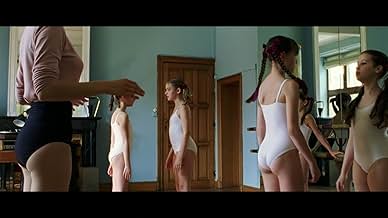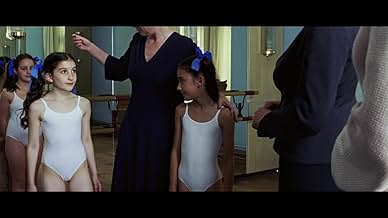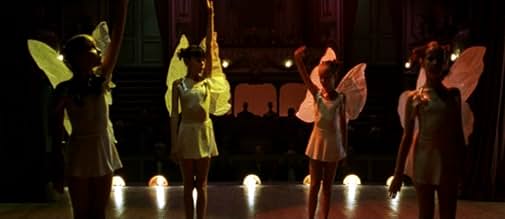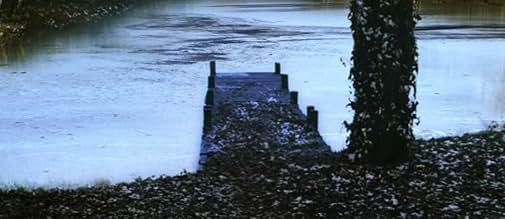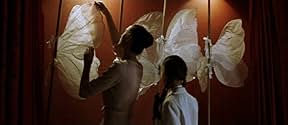IMDb RATING
6.8/10
6.8K
YOUR RATING
A look inside an offbeat boarding school for young girls.A look inside an offbeat boarding school for young girls.A look inside an offbeat boarding school for young girls.
- Director
- Writers
- Stars
- Awards
- 8 wins & 2 nominations total
- Director
- Writers
- All cast & crew
- Production, box office & more at IMDbPro
Featured reviews
10o_cubitt
Innocence is an extraordinary film that explores its theme with such determined rigor one cannot help but be compelled and shocked by every moment. Innocence explores the period in girls' lives before they lose their Innocence and start adulthood. The mysterious school to which we are introduced through Tarkovskyesque images of flowing water becomes a dark and at times haunting manifestation of both the young girls' enforced Innocence as well as the setting for the film's mystery narrative in which we find ourselves desperate to see through the schools wooded grounds to some kind of epiphany.
Part of the success of Innocence is that it is able to confuse the viewer and forces the audience to confront their own ideas of Innocence and how we as adults should view images of Innocence. Images of the young girls at play should be easier to watch but this is an adult film with a predominately adult audience and the darkness of the films own geography plays with ones ideas of Innocence and the loss of it.
Extraordinary images, extraordinary performances, a great film.
Part of the success of Innocence is that it is able to confuse the viewer and forces the audience to confront their own ideas of Innocence and how we as adults should view images of Innocence. Images of the young girls at play should be easier to watch but this is an adult film with a predominately adult audience and the darkness of the films own geography plays with ones ideas of Innocence and the loss of it.
Extraordinary images, extraordinary performances, a great film.
The final title, "for Gaspar" (Noe, director of IRREVERSIBLE), hints at the pedigree of the makers of this quite fascinating study of young girls on the cusp of adolescence.
Benoit Debie, the cinematographer of IRREVERSIBLE, shot the film.
Six year old Iris (Zoe Auclair) arrives at her new country school in a coffin. She becomes infatuated with twelve-year-old Bianca (Berangare Haubruge) who disappears each evening and returns in the morning. The girls spend most of their days studying ballet and preparing for an important exam.
The school is like a keep. The girls are encouraged to find happiness in obedience. Parents never visit. The world beyond its tall hedges exists like something within a dream.
Director Lucile Hadzihalilovic imbues every aspect of the film with a dreamy, meditative veneer. Shots of the pre-teen nymphs dancing, cartwheeling and splashing about in shallow water recall the grainy erotic imagery of David Hamilton's early feature films -- in particular, LAURA and BILITIS. The ballet sequences and striking compositions of solitary female figures in towering external landscapes owe a small debt to Dario Argento's SUSPIRIA and, to a lesser extent, his PHENOMENA. But this is not a deliberate softcore meditation on childhood sexuality. It is a metaphorical examination of how innocence is ruptured by its own curiosity.
The camera angles stress the importance and prominence of legs to a fetishistic degree. This focus is an organic extension of the girls' ballet training; a darker purpose for legs is indicated later in a chilling line of dialogue. Debie's cinematography emphasizes light and shade and is never pretty for its own sake.
The forest filled with lamps has a deliciously surreal, fairytale quality. The sequences where the girls dance for a faceless audience reminded me of one of MULHOLLAND DRIVE's most haunting sequences. The film's sound design also echoes the internal voids of the Lynchian world.
The film is not big on explanations and is a touch too slow at times, but it presents a thoroughly realized universe that is a stark metaphor for life's discoveries and disappointments. The performances possess perfect pitch and the tone remains both haunting and consistent.
What exactly is the film about? The girls may be in a purgatory of sorts, a resting place between life and death. Perhaps not. Perhaps they are in a holding pattern between childhood (innocence) and adulthood (a state requiring some loss of innocence), and when they manage to escape (succumbing to their pre-adolescent curiosity), they have forfeited their place in childhood forever. But only perhaps.
Benoit Debie, the cinematographer of IRREVERSIBLE, shot the film.
Six year old Iris (Zoe Auclair) arrives at her new country school in a coffin. She becomes infatuated with twelve-year-old Bianca (Berangare Haubruge) who disappears each evening and returns in the morning. The girls spend most of their days studying ballet and preparing for an important exam.
The school is like a keep. The girls are encouraged to find happiness in obedience. Parents never visit. The world beyond its tall hedges exists like something within a dream.
Director Lucile Hadzihalilovic imbues every aspect of the film with a dreamy, meditative veneer. Shots of the pre-teen nymphs dancing, cartwheeling and splashing about in shallow water recall the grainy erotic imagery of David Hamilton's early feature films -- in particular, LAURA and BILITIS. The ballet sequences and striking compositions of solitary female figures in towering external landscapes owe a small debt to Dario Argento's SUSPIRIA and, to a lesser extent, his PHENOMENA. But this is not a deliberate softcore meditation on childhood sexuality. It is a metaphorical examination of how innocence is ruptured by its own curiosity.
The camera angles stress the importance and prominence of legs to a fetishistic degree. This focus is an organic extension of the girls' ballet training; a darker purpose for legs is indicated later in a chilling line of dialogue. Debie's cinematography emphasizes light and shade and is never pretty for its own sake.
The forest filled with lamps has a deliciously surreal, fairytale quality. The sequences where the girls dance for a faceless audience reminded me of one of MULHOLLAND DRIVE's most haunting sequences. The film's sound design also echoes the internal voids of the Lynchian world.
The film is not big on explanations and is a touch too slow at times, but it presents a thoroughly realized universe that is a stark metaphor for life's discoveries and disappointments. The performances possess perfect pitch and the tone remains both haunting and consistent.
What exactly is the film about? The girls may be in a purgatory of sorts, a resting place between life and death. Perhaps not. Perhaps they are in a holding pattern between childhood (innocence) and adulthood (a state requiring some loss of innocence), and when they manage to escape (succumbing to their pre-adolescent curiosity), they have forfeited their place in childhood forever. But only perhaps.
Those who expect a straightforward plot with all the answers from Innocence will be disappointed. However, this "open for interpretation" is the strength of the film. This personal interpretation without doubt varies whether the viewer is male or female, child or an adult. Obviously a film about young girls opens differently to women/girls, who can possibly feel similarity with the characters, than to a male viewer who watches the set from the outside - from the darkened audience.
Personally, I saw the film as a demonstration how alien is the world of grown ups to children and how unexplainable many things remain. The film that is clearly shot from the viewpoint of the children and does not tell us much of the environment - answer the basic questions of what and why. Just as children are - and especially were - uninformed about the decisions concerning their life made by their parents/teachers/etc.
Technically the film is very well made, especially the lake shots where camera hovered just centimetres above the surface made me almost feel the water. Also the young actresses performed exceedingly well and felt very natural in their roles.
Personally, I saw the film as a demonstration how alien is the world of grown ups to children and how unexplainable many things remain. The film that is clearly shot from the viewpoint of the children and does not tell us much of the environment - answer the basic questions of what and why. Just as children are - and especially were - uninformed about the decisions concerning their life made by their parents/teachers/etc.
Technically the film is very well made, especially the lake shots where camera hovered just centimetres above the surface made me almost feel the water. Also the young actresses performed exceedingly well and felt very natural in their roles.
We watched this film during my Film History and Theory class this past Thursday and aside from shoddy presentation (the projector was absolutely horrible and displayed the film too dark), I have to say that I enjoyed this quite a bit. At first, I almost dismissed it as artsy, pretentious French cinema due to the very slow pace and methodical direction but it had this eerie quality to it that kept my eyes glued to the screen, anticipating what was yet to come. The story is told in a very abstract way and the story is never really laid out for you in a conventional manner. In truth, it is a very simple tale but told in an imaginative way. There was great imagery and the use of sound to create a mysterious environment was very well done. At times it reminded me of the films of David Lynch, (especially Lost Highway and Mulholland Dr.) and Gaspar Noe (Irreversible), which is probably why I enjoyed it so much. The acting by the principals is very good, considering that they consisted mainly of very young girls. The director managed to capture natural performances from all of them and having worked with children on films in the past, I have to applaud her efforts on this end as I know how difficult it can be to get them to give you the results you're looking for. From a negative stance, the film runs just a bit too long and the pacing could've been trimmed a little to make it run a bit faster and leaner. There were stretches where the film felt like it was never going to end. In the end, I would definitely recommend this to those who appreciate art-house cinema as this caters directly to them. This was an impressive debut for Ms. Hadzihalilovic and I am definitely curious to see what she comes up with next.
RATING: ***1/2 out of *****.
RATING: ***1/2 out of *****.
If you've ever read the work of German symbolist writer Frank Wedekind then you may already have an idea about how difficult a text first feature writer-director Lucile Hadzihalilovic chose to adapt and execute. But execute she does for a good portion of the film until the rather obvious over-the-top conclusion that fails to answer many of the questions raised earlier.
That said, there is much to enjoy this film mainly due to its excellent cinemascope photography and the whole idea of an idyllic place where prepubescent girls are trained to be ballet dancers in order to enter the world as proper teenage women.
Since this is a symbolist writing, one can also entertain thoughts of purgatory (the characters are brought into being via a coffin), isolated same-sex societies (with one old man that is never explained), or some of the themes M. Night Shymalan explored in "The Village" with fear being used to keep a small population under control.
In any case, this film will provoke much discussion afterwards so bring your most knowledgeable cinema pals and dig in. Young girls in white outfits giggling and playing for two hours may not be everyone's simplification of the world at large, but in some ways it does sum up the dangers of segregated societies.
Not bad for a first film with extremely difficult material. A remarkable debut nonetheless.
That said, there is much to enjoy this film mainly due to its excellent cinemascope photography and the whole idea of an idyllic place where prepubescent girls are trained to be ballet dancers in order to enter the world as proper teenage women.
Since this is a symbolist writing, one can also entertain thoughts of purgatory (the characters are brought into being via a coffin), isolated same-sex societies (with one old man that is never explained), or some of the themes M. Night Shymalan explored in "The Village" with fear being used to keep a small population under control.
In any case, this film will provoke much discussion afterwards so bring your most knowledgeable cinema pals and dig in. Young girls in white outfits giggling and playing for two hours may not be everyone's simplification of the world at large, but in some ways it does sum up the dangers of segregated societies.
Not bad for a first film with extremely difficult material. A remarkable debut nonetheless.
Did you know
- TriviaTo reassure some of the film's financiers, Lucile Hadzihalilovic had to hire well-known actresses to play the two teachers, even though they were not the main roles. She then thought of Marion Cotillard and Hélène de Fougerolles: "Both have an image of modern girls, but I find that they have a classic face, a little out of time, which corresponded well to the universe of the film. I also wanted them to be very pretty and feminine."
- GoofsWhen Bianca says goodbye to all the girls there is snow in the alley and they are all outside dressed with bare arms and bare legs. Then Bianca runs away in pouring rain. No more snow on the ground.
- Quotes
Mademoiselle Eva: Unfortunately, not all caterpillars grow into beautiful butterflies. But I hope that in a few years, you will all make me proud.
- Crazy creditsThe entire set of credits is shown at the opening of the movie.
- ConnectionsFeatured in Women Make Film: A New Road Movie Through Cinema (2018)
- SoundtracksOrchestral Suite from La Petite Renard Rusée
Composed by Leos Janácek
Libretto by Rudolf Tesnohlídek
Performed by Czech Philharmonic (as The Czech Philharmonic)
Conducted by Vaclav Talich
- How long is Innocence?Powered by Alexa
Details
- Release date
- Countries of origin
- Language
- Also known as
- Невинність
- Filming locations
- Parc du Cinquantenaire, Brussels, Belgium(walking to new school)
- Production companies
- See more company credits at IMDbPro
- Runtime
- 2h 2m(122 min)
- Color
- Sound mix
- Aspect ratio
- 2.35 : 1
Contribute to this page
Suggest an edit or add missing content


